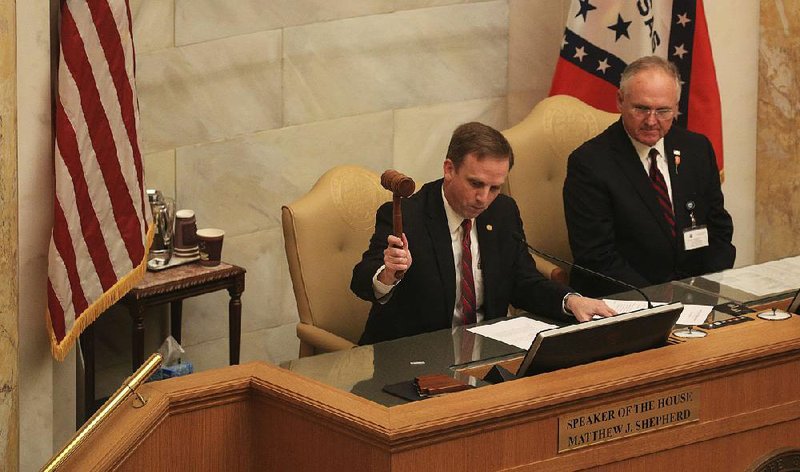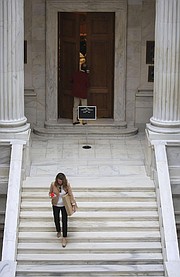Just before adjourning this year's regular legislative session, the Arkansas Senate on Wednesday sent the governor a bill that would allow the Little Rock Board of Directors to propose changing the city's form of government.
Little Rock has a city manager form of government. Senate Bill 179 by Sen. Mark Johnson, a Republican who lives in the Ferndale area outside Little Rock, would allow the capital city's directors -- and those in other cities with that form of government -- to propose switching to the mayor-council form. The bill also addresses changes in cities with city administrator forms of government.
The Senate voted 31-1 to approve SB179 after concurring with a House-approved amendment to the bill in a voice vote.
On the other side of the state Capitol, House Speaker Matthew Shepherd, R-El Dorado, wound down the session by thanking family, friends, lawmakers, constituents and House staff members, and commending representatives for working hard and efficiently for the 88 days that the 92nd General Assembly met.
He said Washington, D.C., could learn from the way members from across the state worked together during the 2019 session.
"History will judge what we've done here," Shepherd said.
[RELATED: Complete Democrat-Gazette coverage of the Arkansas Legislature]
"I think that what we've seen is that we ran a very efficient session. We kept some of the drama to a minimum, and I'm very proud of the fact of how we worked and the fact we gave our best efforts," he said. "I realized at the end of a session that probably for each of us there's probably a few bills that we wished would've passed. There's probably a few bills that each of us wished had not passed. But at the end of the day, we came together to represent the people of Arkansas, and we did so with professionalism and civility."
On Wednesday, the final day of this year's session, Johnson surprised some colleagues by asking the Senate to suspend the rules to allow consideration of SB179. Johnson said the House passed an amended version of his bill after the Senate recessed April 10.
SB179 -- which does not name any specific city -- would allow the board of directors in cities with the city manager form of government to propose changing to the mayor-council form. The proposal would be an ordinance presented to the mayor that would set a special election.
Besides Little Rock, other cities with the city manager form of government are Arkadelphia, Hot Springs, Hope and Texarkana, said Lanny Richmond, an attorney with the Arkansas Municipal League.
SB179 also would allow the board of directors in cities with the city administrator form of government to refer to voters in a special election, through an ordinance to the mayor, a proposal to change the form of government. Barling, Fort Smith and Siloam Springs have the city administrator form of government, Richmond said.
Current state law requires petitions to be presented to the mayor to change the form of government from city manager to mayor-council. Before a special election can be called, the petitions must have valid signatures of voters equal to at least 15 percent of the ballots cast for mayor in the most recent general election with that race.
Like with the city manager form of government, current state law requires petitions to be presented to the mayor in a city administrator-run city to change the form of government to the city manager form.
Sens. Alan Clark, R-Lonsdale; Gary Stubblefield, R-Branch; Stephanie Flowers, D-Pine Bluff; Keith Ingram, D-West Memphis; and Greg Leding, D-Fayetteville, signed the bill out of the eight-member Senate City, County and Local Affairs Committee, according to Senate records. Five votes are required for the bill to clear the committee.
Sen. Linda Chesterfield, D-Little Rock, told senators that it would be unusual for the Senate to allow for the consideration of this bill on the final day of the session, but she and Johnson support the bill.
"It would be helpful to us for once in your life to do something a little different for me," Chesterfield said.
Johnson needed at least 24 votes in the 35-member Senate to suspend the rules for the chamber to consider concurring with the House amendment and sending the bill to Gov. Asa Hutchinson. The Senate voted 24-3 to suspend the rules.
Johnson told senators that Little Rock Mayor Frank Scott asked for the bill to be amended by Rep. Fred Love, D-Little Rock, in the House to require the Little Rock board, rather than the Pulaski County Board of Election Commissioners, to redraw the boundaries of the wards.
Johnson said in an interview that he came up with the bill on his own, after there was discussion in the Little Rock mayor's race last year about changing the form of government. He said his intent is to simplify the process for changing the form of government. He said he favors eliminating the three at-large representatives on Little Rock's 10-member board of directors, which includes seven directors who represent wards.
Asked about the Little Rock mayor's position on the bill, Scott spokesman Stephanie Jackson said Scott isn't making any public statements about the legislation. She added that neither Scott nor anyone in his administration asked for the bill to be filed.
She confirmed that Scott asked Johnson to have the bill amended so the Little Rock Board of Directors, rather than the Board of Election Commissioners, would redraw the ward boundaries.
Scott is a former aide to former Gov. Mike Beebe, a Democrat. Scott also is a former state highway commissioner and former First Security Bank executive.
Asked whether Hutchinson, a Republican, plans to sign the bill, his spokesman J.R. Davis said Wednesday afternoon in an email to this newspaper that "he hasn't had a chance to review it yet" and "will study it more tonight."
The bill also addresses how terms would be handled of existing officials if a change is approved by voters.
Under SB179, at the time the mayor-city council reorganization would be effective, the mayor would continue to serve in office until his term expires. The same would apply to members of the City Council. The terms of existing officials would be handled the same when switching to the city manager form from city administrator.
The bill also addresses lengths of terms of city council members for a city with a population above 100,000. A person on the 2020 ballot for city council would serve a two-year term if elected. After the 2022 general election, newly elected city council members would draw initial two- or four-year terms, eventually resulting in staggered four-year terms.
The bill was approved by a Republican-majority Legislature.
The 92nd General Assembly consists of 76 Republicans and 24 Democrats in the House and 26 Republicans and nine Democrats in the Senate.
House Democratic leader Rep. Charles Blake of Little Rock reviewed the session at a state Democratic Party news conference shortly after the Legislature adjourned Wednesday. He noted that the Democratic caucus -- being a super-minority party -- is often judged for fighting majority legislation instead of proposing its own. He said he was particularly proud that several Republican-sponsored bills aiming to roll back aspects of the state's new citizen-initiated minimum wage law failed.
He added that Democrats started conversations about important issues even though some pieces of legislation related to those issues didn't become law.
"I hope over the 90 days of the 92nd General Assembly we provided a clear alternative to what could be accomplishing in this state if we had more like-minded people serving," Blake said.
The 88-day length of the 92nd General Assembly's regular session falls in the middle of the range of lengths for other sessions: 96 days in 2011, 101 days in 2013, 82 days in 2015 and 86 days in 2017. Regular sessions start in January of odd-numbered years.
Shepherd implored lawmakers to continue to work efficiently as they travel to the state Capitol for committee meetings in between legislative sessions. As he gaveled the House out for the final time, several members shouted in celebration and stood in applause.
A Section on 04/25/2019



